If you’re looking for a tattoo design that’s rich in symbolism and cultural references, then a Japanese mask tattoo might be just what you need. These tattoos have been popular for decades, and they continue to be a favorite among tattoo enthusiasts all over the world. In this article with Impeccable Nest, we’ll take a closer look at the meaning of Japanese mask tattoos.
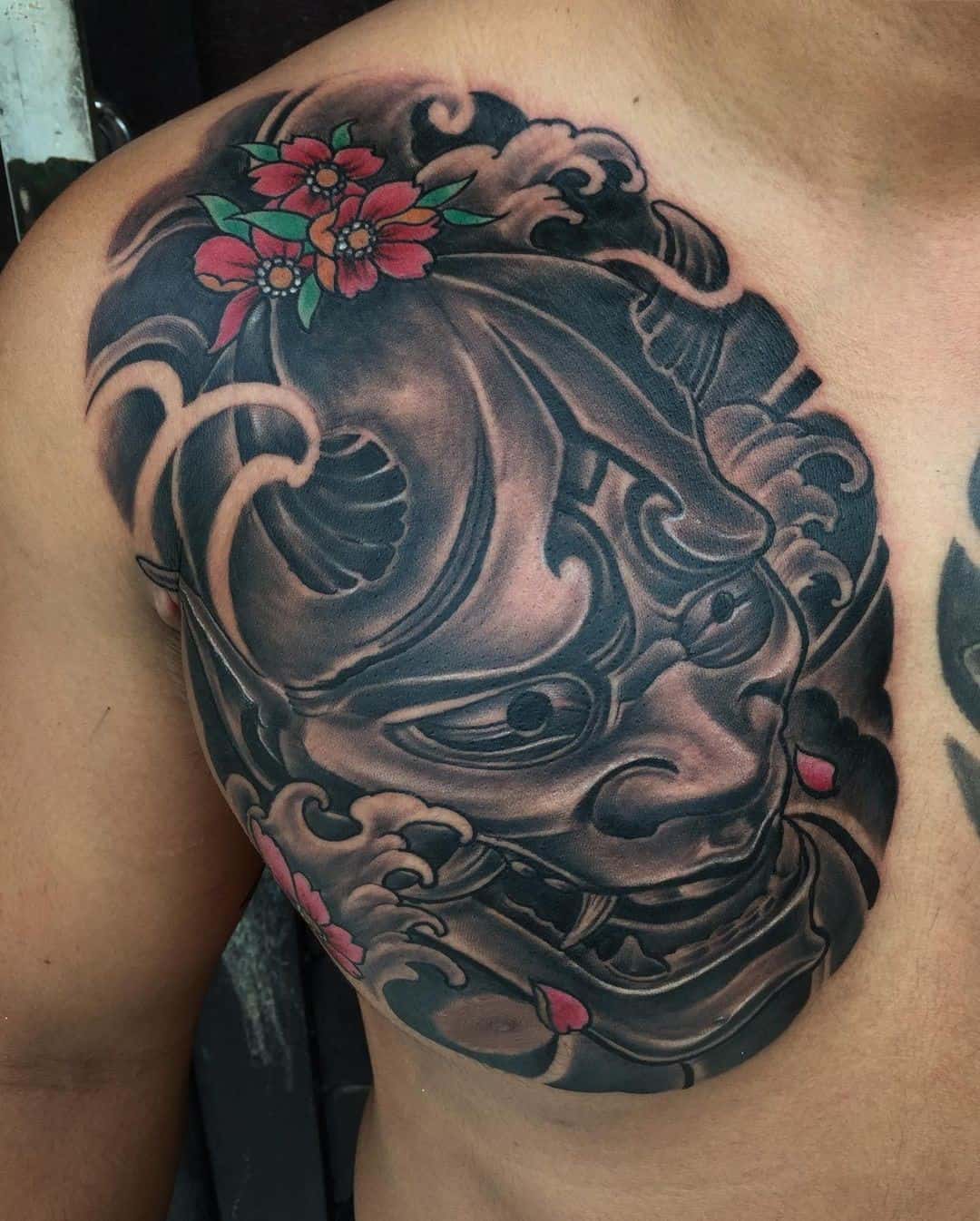
Japanese Mask Tattoo Meaning: Exploring the Cultural
Some of the most common meanings behind japanese mask tattoo meanings include:
Protection
Japanese Mask Tattoo Meaning:
Mask tattoos hold significant meaning in Japanese culture and are often associated with the concept of protection. In Japanese folklore, masks are believed to possess the power to ward off evil spirits, illnesses, and misfortunes. When these mask designs are transformed into tattoo art, they become a symbolic shield against harm, providing a sense of spiritual protection for the wearer.
The cultural significance of masks in Japan dates back centuries and has roots in traditional theater, religious rituals, and daily life. Masks were used by performers in Noh and Kabuki theaters to portray various characters and emotions, allowing actors to embody different personas. These masks not only served as a tool for storytelling but also held spiritual value and were believed to possess supernatural powers.
When someone chooses to have a Japanese mask tattoo, they are embracing the symbolism associated with these ancient traditions. The wearer seeks to harness the protective qualities attributed to masks, aiming to create a connection with the spiritual realm that can safeguard them from negative influences.
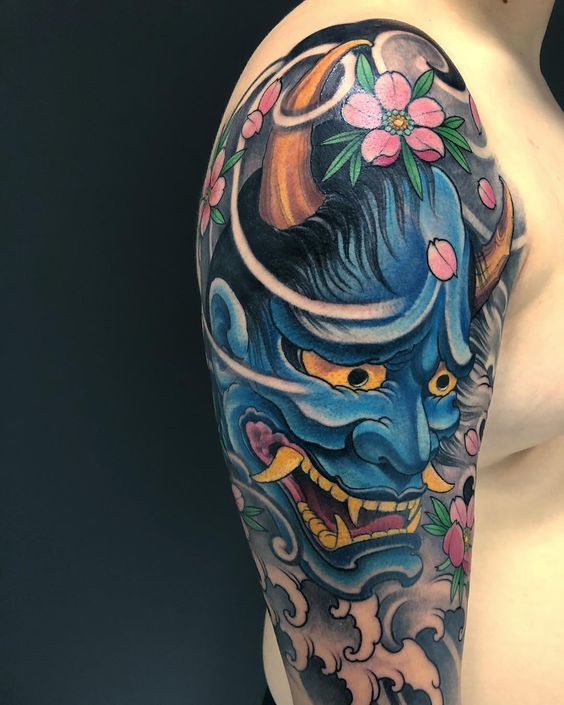
A common motif seen in Japanese mask tattoos is the Hannya mask. This mask represents a jealous and vengeful female demon, originating from Noh theater. It symbolizes the complexities of human emotions, particularly those related to love and obsession. By getting a Hannya mask tattoo, the individual may be expressing their desire to protect themselves from emotional turmoil or to shield themselves from destructive relationships.
Another popular mask design is the Kitsune mask, which is associated with fox spirits in Japanese mythology. Foxes are believed to possess shape-shifting abilities and possess intelligence and cunningness. Kitsune masks often depict a mischievous or cunning expression, symbolizing the protection against deceit and trickery. People who choose this tattoo design may seek to guard themselves from manipulation or dishonesty in their lives.
Oni masks are also commonly incorporated into Japanese mask tattoos. Onis are legendary creatures similar to demons or ogres and are traditionally depicted as fierce and monstrous beings. They are often associated with punishment and retribution. By having an Oni mask tattoo, the wearer may be expressing their desire to protect themselves from their own inner demons or past mistakes.
In addition to their protective symbolism, Japanese mask tattoos can also represent courage and strength. Wearing such a tattoo demonstrates a willingness to confront challenges head-on and face adversity with resilience. It symbolizes the wearer’s determination to overcome obstacles and emerge victorious in the face of hardship.
Ultimately, the meaning behind a Japanese mask tattoo will vary depending on the specific design chosen and the individual’s personal interpretation. However, the overarching theme of protection remains a constant. These tattoos serve as a visual reminder of the wearer’s desire for spiritual safeguarding and their commitment to living a life shielded from harm, misfortune, and negative influences.
Change
Japanese Mask Tattoo Meaning:
In Japanese culture, masks hold a significant symbolic value and are deeply rooted in various aspects of their society. These masks not only serve as decorative items but also carry profound cultural and spiritual meanings. When it comes to tattoos depicting masks, they encompass a rich symbolism that goes beyond mere aesthetics.
Masks have long been associated with transformation in Japanese traditions. During festivals or religious rituals, participants adorn themselves with masks to temporarily adopt a different identity and personify specific qualities or spirits. This act of wearing masks allows individuals to transcend their own self-identities and immerse themselves fully in the experience of embodying another persona.
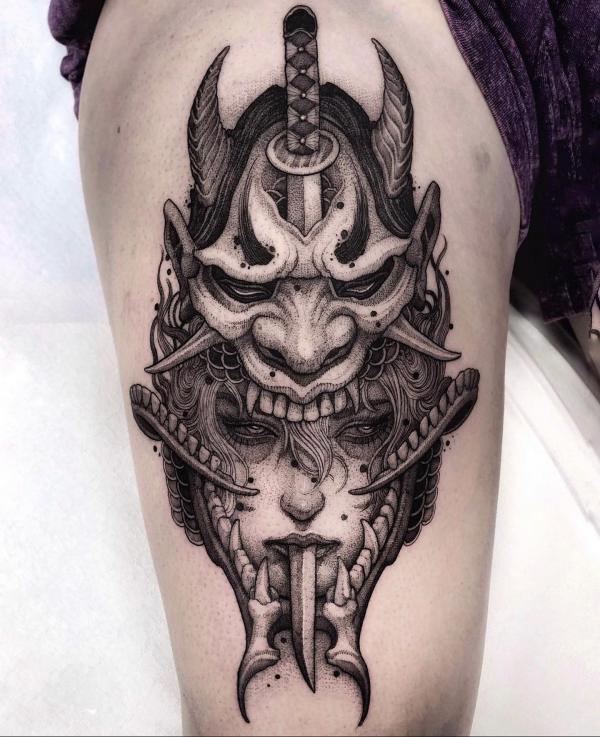
The belief behind mask tattoos is closely tied to this concept of transformation and the willingness to embrace life’s changes. These tattoos serve as reminders of the ever-changing nature of existence and the importance of embracing new perspectives and personas. Just as festival-goers don masks to become someone else for a short period, mask tattoos symbolize the wearer’s desire to adapt and grow through different stages of life.
The motifs used in these tattoo designs can vary, ranging from traditional Noh theater masks, kabuki masks, to mythical creature masks like the Tengu or Hannya. Each mask carries its own unique significance, representing different archetypes, spirits, or emotions. Noh masks, for instance, often portray characters with diverse personalities, such as gods, warriors, or demons, each associated with distinct traits and narratives.
When an individual chooses to permanently ink a mask tattoo onto their body, they are making a statement about their personal journey of transformation. It signifies their acknowledgment of the fluidity of life and their readiness to adapt to new circumstances. These tattoos can be seen as visual affirmations of one’s ability to take on new roles, face challenges head-on, and evolve as a person.
Beyond personal growth, mask tattoos can also represent a connection to Japan’s rich cultural heritage. By adorning their bodies with these symbolic designs, individuals may express their admiration for traditional arts and customs of Japan. These tattoos become a way to honor the country’s history while also showcasing their own individuality and artistic expression.
In summary, Japanese mask tattoos hold a deep meaning that goes beyond their visual appeal. They represent the concept of transformation and the embrace of life’s changes. By donning masks during festivals, individuals temporarily assume new identities, and mask tattoos serve as reminders of this willingness to adapt and grow. These tattoos symbolize an individual’s journey of personal growth, their connection to Japanese culture, and their affinity for embracing the various personas life offers.
Theater
Japanese Mask Tattoo Meaning:
In Japanese culture, masks hold a significant place, particularly in traditional performing arts like Noh and Kyogen theater. These theatrical forms are deeply rooted in the country’s history and heritage, dating back centuries. Masks serve as powerful tools for portraying specific characters, conveying emotions, and bringing performances to life on stage. It is within this context that mask tattoos have acquired their unique meaning and significance.
When someone chooses to get a Japanese mask tattoo, it often represents their appreciation and love for Japanese theater. It reflects their admiration for the artistry, skill, and craftsmanship involved in creating these intricate masks. These tattoos serve as a tribute to the rich cultural tradition of Noh and Kyogen and their enduring impact on the Japanese artistic landscape.
Each mask used in Noh and Kyogen theater represents a distinct character, and the choice of mask for a tattoo can hold personal symbolism for the wearer. For example, the “Okina” mask portrays an elderly man and symbolizes wisdom, serenity, and longevity. By adorning this mask as a tattoo, a person may want to express their desire for a long and fulfilling life filled with knowledge and tranquility.
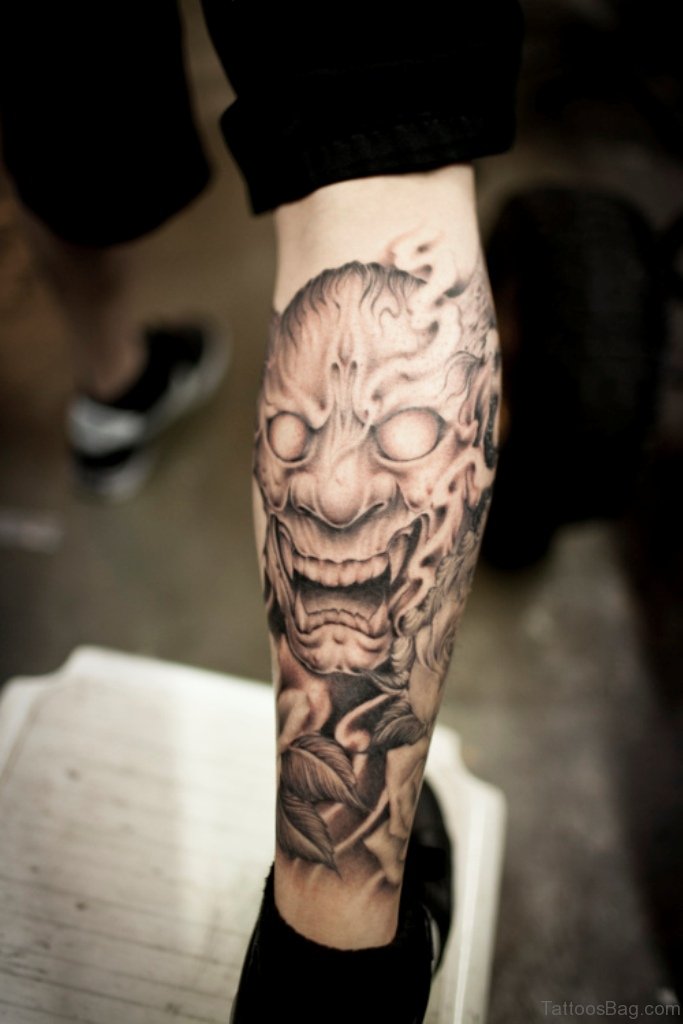
Similarly, the “Hannya” mask, representing a jealous and vengeful female spirit, is known for its intense expression of anger and sorrow. This mask is often associated with themes of love, passion, and betrayal. Getting a Hannya mask tattoo may signify a personal connection to these emotional states or serve as a reminder to navigate complex relationships and emotions with caution.
The “Tengu” mask, depicting a mythical creature with both human and bird-like features, is another popular choice for tattoos. Tengu masks convey courage, strength, and supernatural powers. People who resonate with these qualities or admire the mysterious nature of the Tengu might opt for this mask tattoo to symbolize their own inner strength and resilience.
The process of selecting a specific mask for a tattoo allows individuals to personalize their inked artwork. It enables them to align themselves with the character traits and emotions associated with a particular mask, thereby representing their own unique personality or life experiences.
Additionally, Japanese mask tattoos often showcase the intricate designs and attention to detail found in traditional Noh and Kyogen masks. These tattoos can display the skillful brushwork, elaborate patterns, and delicate expressions that make these masks visually captivating. The wearer’s choice to permanently etch one of these masks onto their skin indicates a deep appreciation for the art form and serves as a lifelong homage to Japanese theater.
In conclusion, Japanese mask tattoos embody the admiration and love for the rich cultural heritage of Noh and Kyogen theater. They represent an individual’s connection to the artistry, characters, and emotions expressed through these masks. By choosing a specific mask design, wearers can express personal traits, desires, or experiences while also displaying the beauty and intricacy of traditional Japanese mask craftsmanship.
Duality
Japanese mask tattoos hold deep cultural significance and are rich in symbolism. These tattoos are inspired by traditional Japanese masks, which have been used for centuries in various artistic forms such as theater, festivals, and religious ceremonies. The masks themselves often depict contrasting human qualities, reflecting the intricate nature of human emotions.
In Japanese culture, masks serve as a powerful means of expression. A single mask can represent a myriad of emotions and embody multiple facets of human existence. This duality is a fundamental concept in Japanese philosophy, reflecting the belief that life is composed of both positive and negative aspects. Similarly, Japanese mask tattoos aim to convey this understanding of human duality and the vast range of emotions we experience throughout our lives.
One common motif found in these tattoos is the integration of both comedic and somber elements within a single mask. This juxtaposition symbolizes the coexistence of joy and sorrow in our lives. It acknowledges that happiness and sadness are interconnected and inseparable. Through these tattoos, individuals emphasize the importance of embracing all emotions instead of suppressing or denying them.
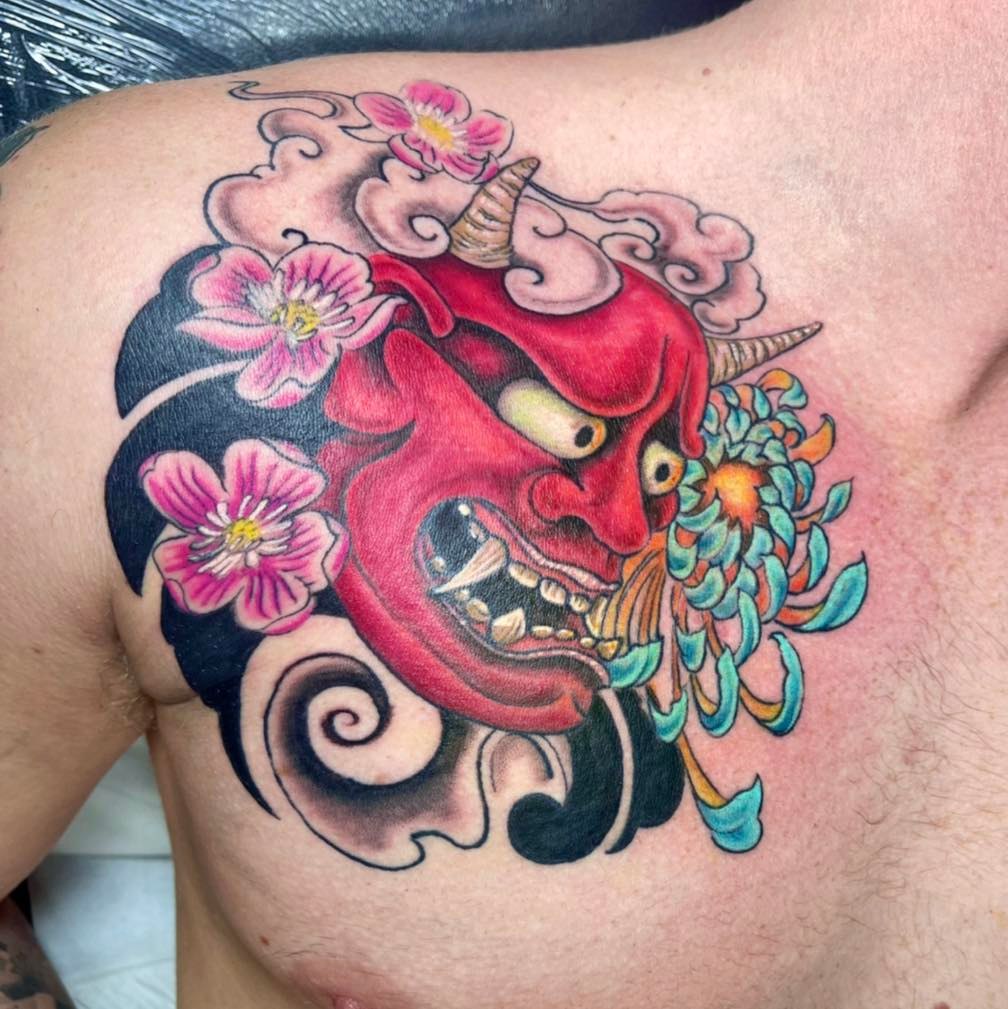
Furthermore, Japanese mask tattoos often express the belief in the complexity of human nature. Just as a mask can portray both benevolence and wrath, these tattoos represent the multifaceted personalities and characteristics present in each individual. They remind us that we possess the capacity for both kindness and anger, compassion and vengeance. By acknowledging these contradictory traits, the wearer aims to achieve a balance between light and dark within themselves.
The choice to adorn one’s body with a Japanese mask tattoo can also signify reverence for the traditions and rituals associated with these masks. Throughout history, masks have been used in various cultural practices, particularly in Noh and Kabuki theater. These art forms employ masks as a means of storytelling, allowing performers to inhabit different characters with distinct emotions. By getting a mask tattoo, individuals pay homage to the artistry and cultural heritage surrounding these masks.
Moreover, Japanese mask tattoos can serve as a reminder of the transient nature of life. In traditional Japanese culture, masks were often used during funerals and memorial services to embody the spirits of the deceased. By wearing these tattoos, individuals acknowledge the impermanence of existence and honor the memory of loved ones who have passed away.
In summary, Japanese mask tattoos are infused with profound symbolism and meaning. They represent the belief in human duality, highlighting the interconnectedness of joy and sorrow, kindness and anger, and various other contrasting emotions. These tattoos also reflect the complexity of human nature and the importance of acknowledging all aspects of oneself. Additionally, they pay tribute to Japanese cultural traditions, rituals, and the fleeting nature of life.
Ancestry
Japanese mask tattoos hold significant meaning for those who choose to adorn their bodies with this traditional motif. For many individuals, these tattoos serve as a way to pay homage to their cultural heritage, especially if they have Japanese ancestry. By incorporating Japanese mask designs into their body art, they are expressing a deep respect and appreciation for their roots.
The masks themselves have a rich history in Japanese culture and artistic traditions. Known as “Noh” masks, they originated from the classical Japanese theatrical form called Noh, which dates back to the 14th century. Noh plays are characterized by their stylized movements, poetic dialogue, and the use of intricately designed masks to represent various characters.
Each Noh mask has its own distinct characteristics and symbolism, often representing different archetypes or emotions. These masks can depict a wide range of characters, including supernatural beings, deities, ghosts, samurai warriors, and even animals. Each mask serves as a visual representation of specific traits and narratives associated with the character it represents.
When someone chooses to get a Japanese mask tattoo, they are
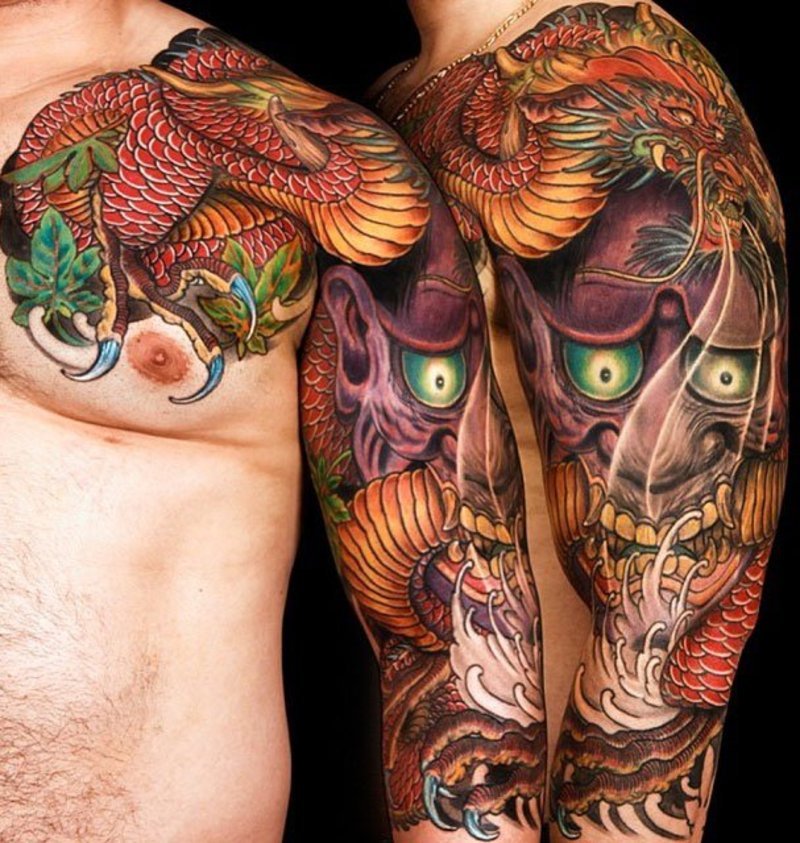
not only embracing the aesthetic beauty of the design but also delving into the deeper meanings behind these masks. They may resonate with the symbolic representation of a particular mask character, connecting with the emotions, stories, and values associated with it.
For instance, a person might choose a Hannya mask tattoo, which depicts a female demon with intense anger and jealousy. This mask symbolizes the complex nature of human emotions and warns against the destructive power of unchecked desires. By wearing such a tattoo, an individual may display their understanding and acknowledgement of the duality of human emotions and the need for self-control.
Alternatively, a tattoo enthusiast may opt for a Tengu mask design. Tengu are mythical creatures often depicted with a long nose and bird-like features. These masks represent divine protectors of the mountains and forests, embodying wisdom, strength, and a connection to nature. By incorporating a Tengu mask tattoo, one might express their reverence for nature and their desire to embody the qualities associated with these legendary beings.
In addition to personal interpretations, Japanese mask tattoos can also reflect an individual’s admiration for Japanese traditions as a whole. Japan has a rich cultural history that spans centuries, encompassing art forms, rituals, and philosophies that are highly revered worldwide. By adorning their bodies with these traditional designs, individuals not only honor their own heritage but also demonstrate a deep respect for Japanese culture and its enduring legacy.
Japanese mask tattoos require a skilled artist who is well-versed in the intricacies of Noh masks and their cultural significance. The process of getting such a tattoo involves careful research, consultation, and collaboration between the tattoo artist and the recipient. It is essential to ensure the accuracy and authenticity of the design, as well as its placement on the body.
Overall, Japanese mask tattoos serve as a powerful means of expressing cultural identity, paying homage to ancestral heritage, and showcasing a deep appreciation for Japanese traditions and aesthetics. These tattoos go beyond mere body art, carrying profound symbolism and encapsulating the beauty and complexity of Japanese culture.
Whimsy
Japanese Mask Tattoo Meaning:
Tattoos have become a popular form of self-expression, allowing individuals to showcase their personality, beliefs, and interests. Among the myriad tattoo designs available, the Japanese mask tattoo stands out as a unique and intriguing choice. These masks hold significant cultural symbolism and historical relevance in Japan, making them a fascinating subject for tattoo art.
Japanese masks are renowned for their vibrant colors and exaggerated expressions, often depicting characters from traditional folklore, Noh theater, or Kabuki performances. While some mask tattoos carry deep and profound meanings, there are also those chosen purely for their playfulness and whimsy. These lighthearted mask tattoos can represent a person’s sense of humor, love for the unconventional, and their ability to embrace joy in life.
Humor is an essential aspect of the human experience, serving as a universal language that brings people together. Choosing a Japanese mask tattoo that exudes humor allows individuals to express their light-hearted nature and bring smiles to those around them. These tattoos can act as visual reminders to appreciate the little things in life and not take oneself too seriously.
The unconventional nature of Japanese mask tattoos also adds to their appeal. By opting for such a design, individuals demonstrate their willingness to break away from societal norms and embrace uniqueness. These tattoos symbolize a desire to stand out and celebrate individuality. They serve as a reminder to be authentic and true to oneself, even in a world that often encourages conformity.
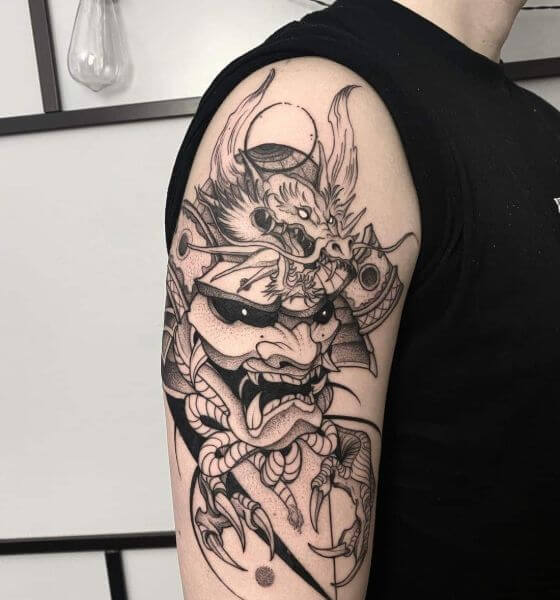
The vibrant colors used in Japanese mask tattoos further enhance their symbolic significance. In traditional Japanese culture, colors hold specific meanings. Red, for instance, represents passion, energy, and vitality. Blue signifies tranquility and spirituality, while yellow represents cheerfulness and optimism. By incorporating these colors into their mask tattoos, individuals can imbue their artwork with additional layers of meaning and personal significance.
Moreover, the exaggerated expressions on Japanese masks contribute to the overall message conveyed by the tattoo. These expressive faces can reflect one’s emotional range or the ability to adapt and navigate through life’s ups and downs. They can remind individuals to embrace their emotions, whether it be joy, sorrow, anger, or excitement, and to approach each experience with an open heart.
In conclusion, Japanese mask tattoos hold both serious and playful meanings, allowing individuals to convey various aspects of their personality. While some people may choose these tattoos to showcase their sense of humor, lightheartedness, and love for the unconventional, others may find deeper symbolism in the historical and cultural significance of these masks. Ultimately, a Japanese mask tattoo is a visually striking and meaningful choice that invites curiosity and conversation while reflecting the wearer’s individuality and zest for life.
Japanese Mask Tattoo Designs
There are many different types of Japanese masks, each with its unique design and meaning. Here are some of the most popular Japanese mask tattoo designs:
Hannya Mask
The Hannya mask is one of the most popular Japanese mask tattoos. This mask is often seen as a symbol of anger and jealousy, although it can also represent transformation and enlightenment. The Hannya mask is typically depicted with sharp teeth and bulging eyes, and it’s often used to scare off evil spirits.
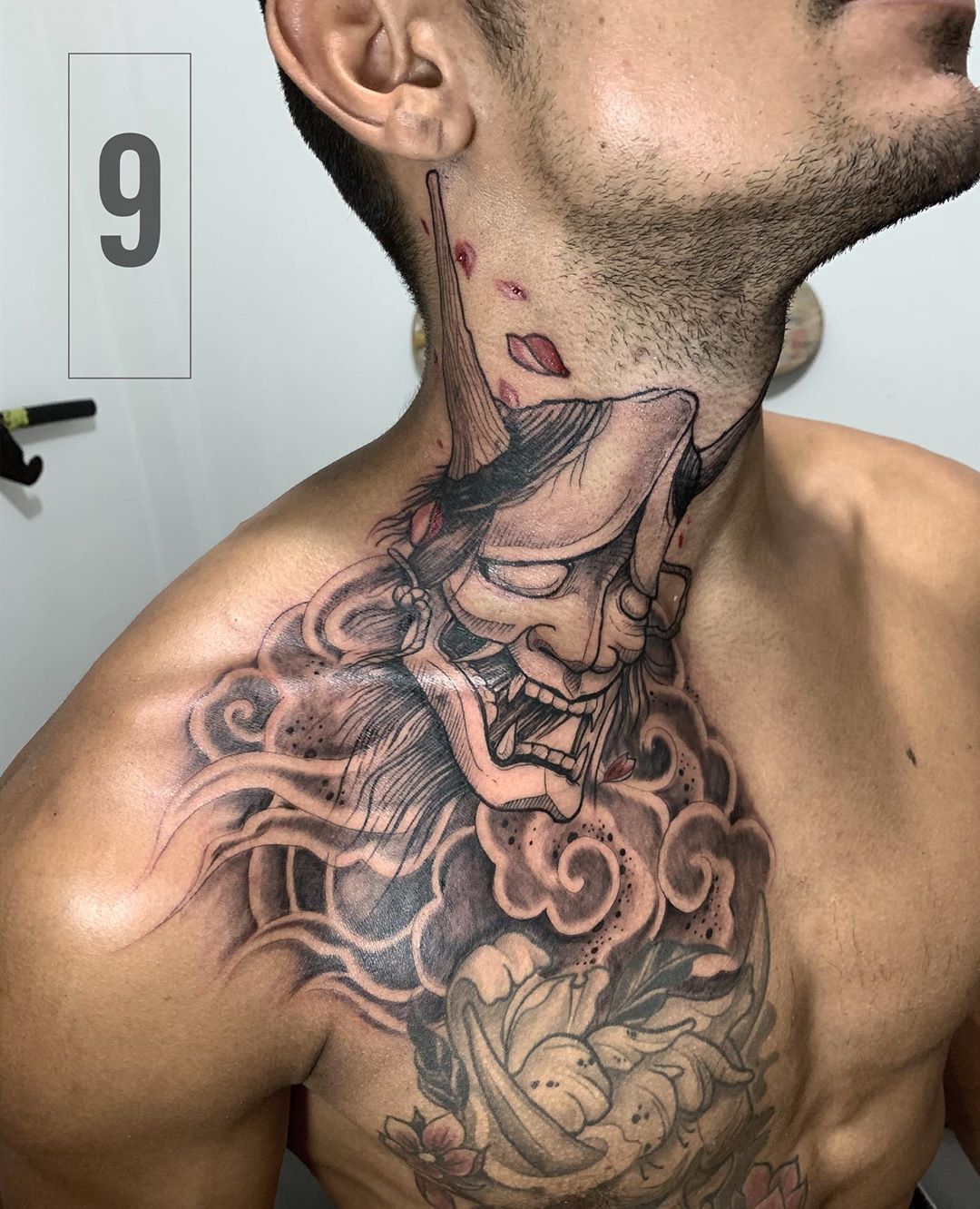
Oni Mask
The Oni mask is another popular Japanese mask tattoo design. This mask represents demons and monsters in Japanese mythology and is often used to symbolize strength and protection. Oni masks are typically depicted with horns and fangs, and they are often painted in bright, bold colors.
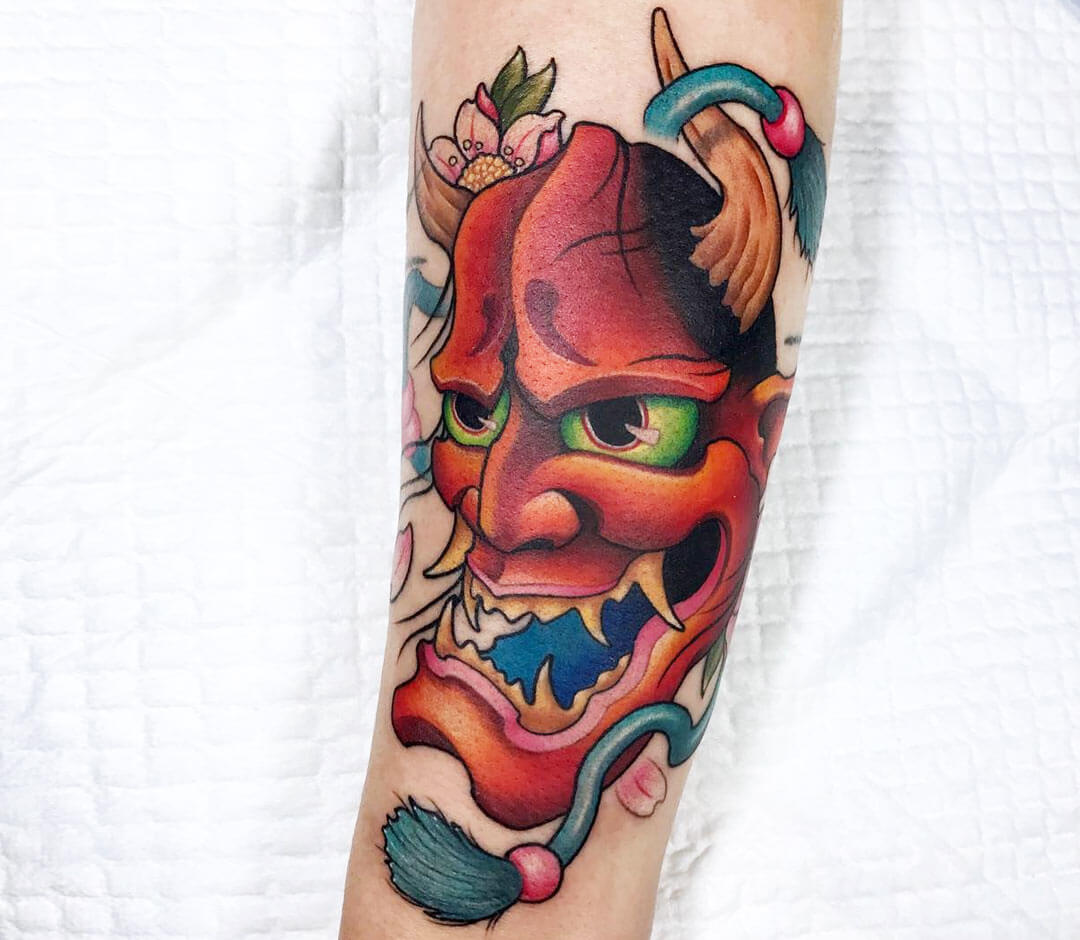
Kitsune Mask
The Kitsune mask is a type of fox mask that is often used in Japanese folklore. These masks represent the fox spirit, which is known for its intelligence and mischievousness. Kitsune masks are often depicted with pointed ears and a long snout, and they are typically painted in white or red.
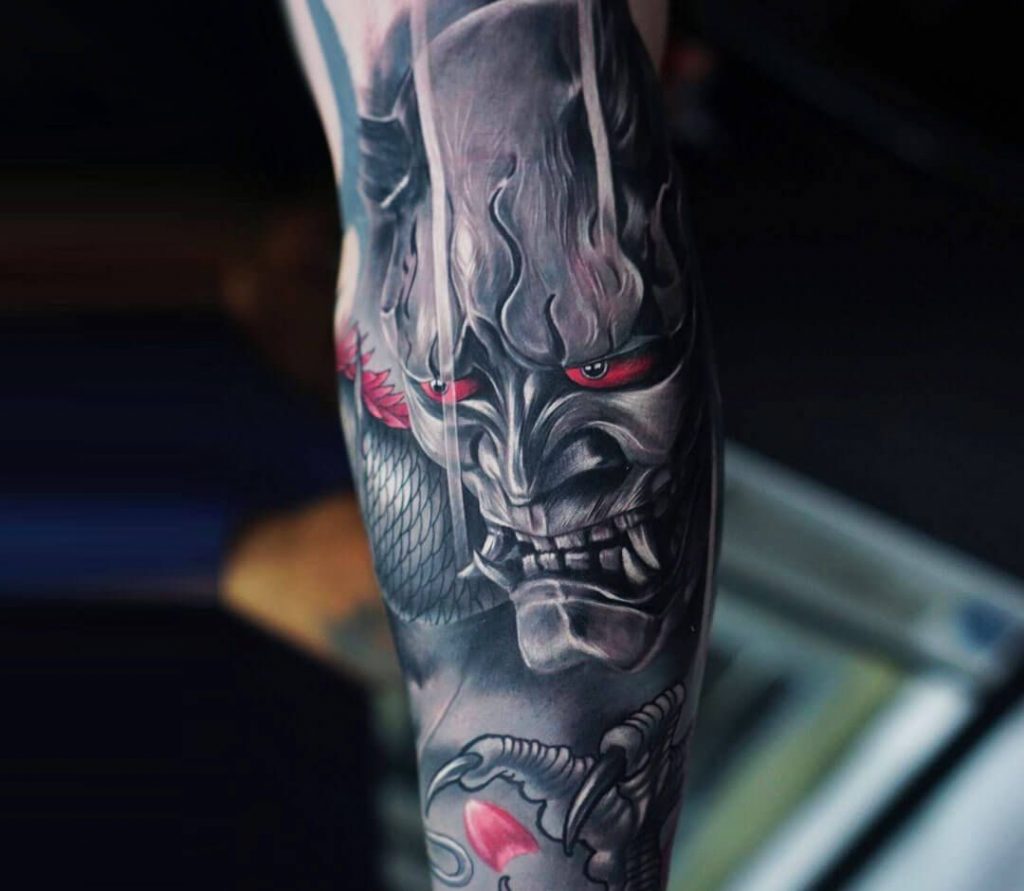
Samurai Mask
The Samurai mask is a classic Japanese mask tattoo design that is often associated with honor and duty. These masks were worn by samurai warriors in battle, and they were meant to intimidate enemies and protect the wearer from harm. Samurai masks are typically depicted with fierce expressions and intricate details.
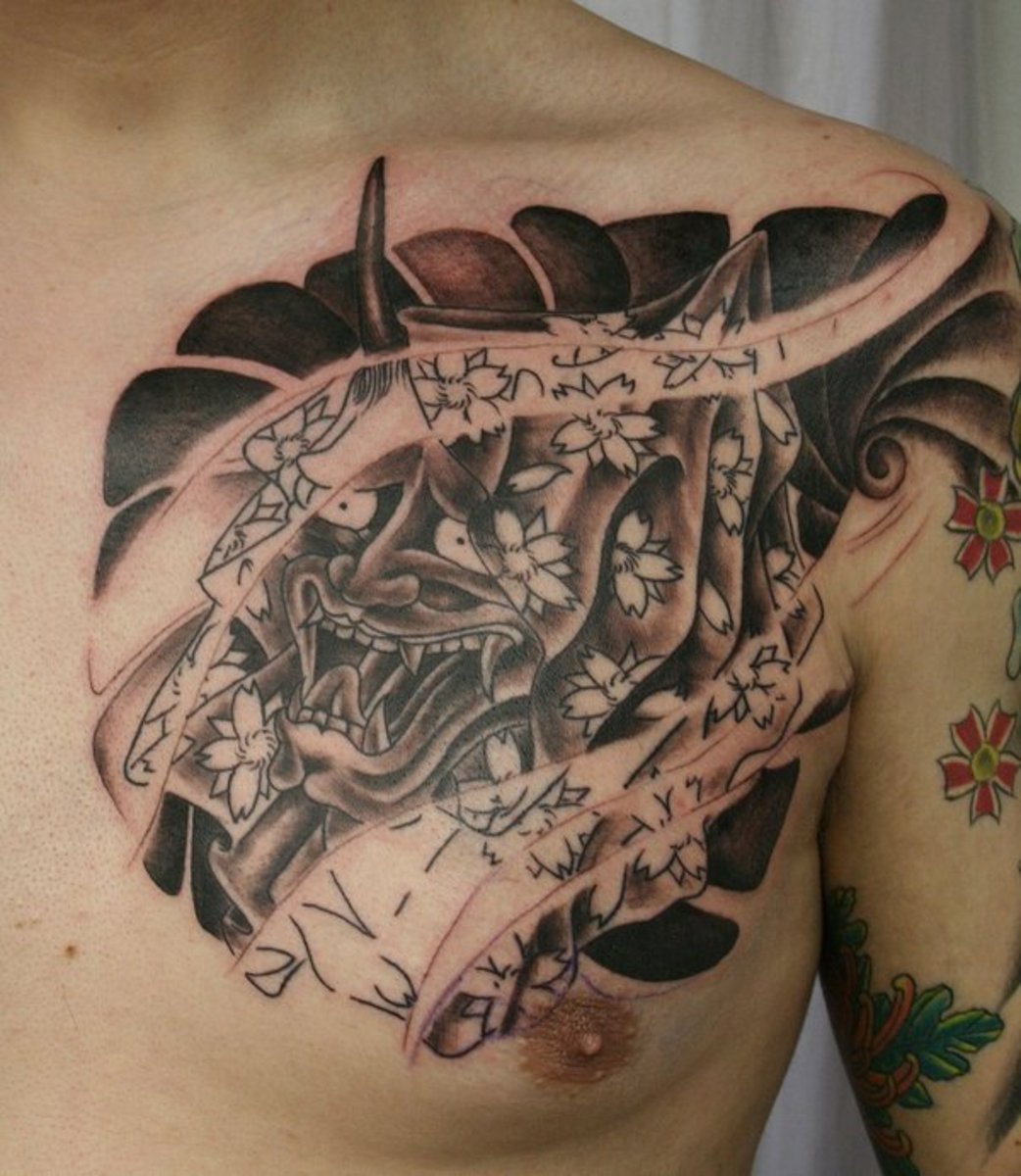
Examples of Japanese Mask Tattoo Designs
Here are some examples of Japanese mask tattoo designs to give you an idea of what these tattoos can look like:
- A Hannya mask tattoo on the shoulder, with the mask’s sharp teeth and bulging eyes emphasizing the tattoo’s menacing appearance.
- An Oni mask tattoo on the back, with the mask’s horns and fangs symbolizing strength and power.
- A Kitsune mask tattoo on the arm, with the mask’s pointed ears and long snout representing the fox spirit’s intelligence and playfulness.
- A Samurai mask tattoo on the chest, with the mask’s intricate details and fierce expression signifying honor and duty.
-
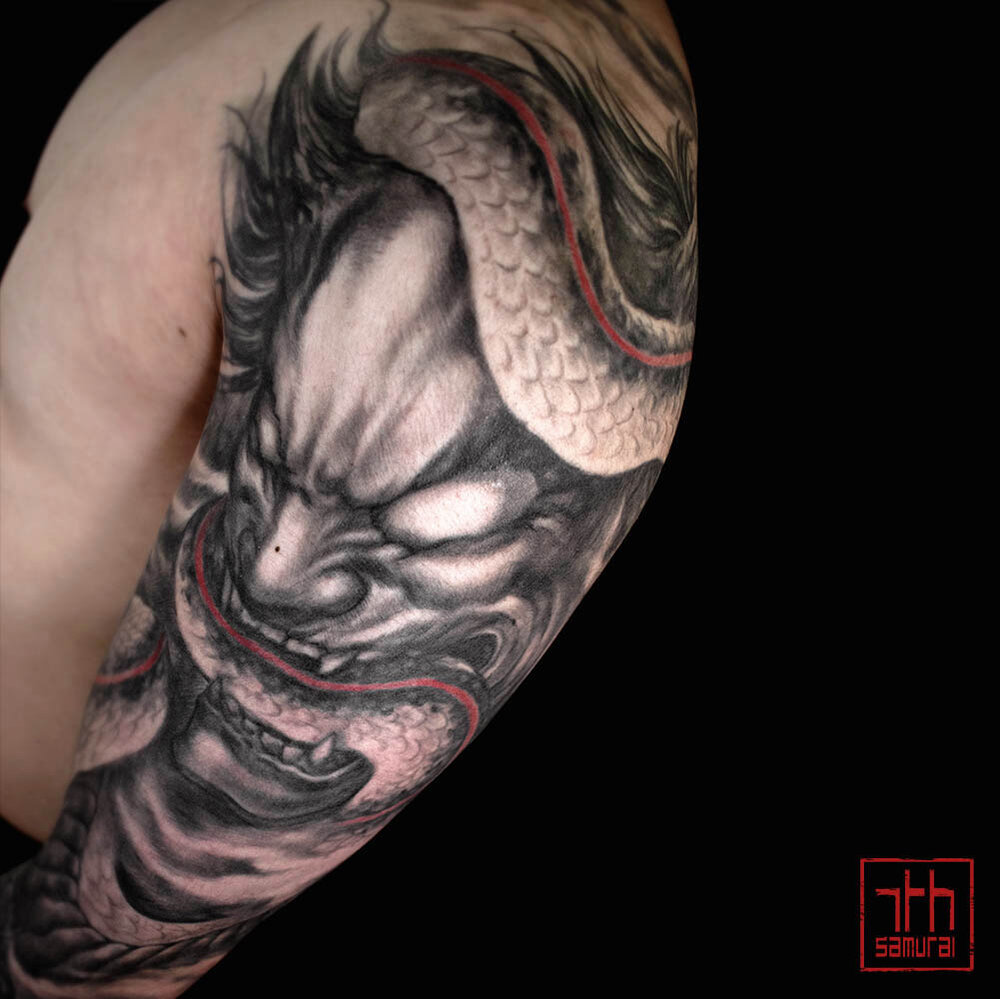
Comparisons of Japanese Mask Tattoo Designs
While there are many different types of Japanese mask tattoos, each with its unique design and symbolism, some designs are more popular than others. Here are some comparisons of Japanese mask tattoo designs:
- Hannya vs. Oni: Both Hannya and Oni masks represent strength and power, but Hannya masks are often associated with anger and jealousy, while Oni masks are seen as protectors against evil spirits.
- Kitsune vs. Samurai: While Kitsune masks represent the fox spirit’s intelligence and playfulness, Samurai masks symbolize honor and duty. Both designs can be intricate and detailed, but Kitsune masks tend to be painted in white or red, while Samurai masks are often depicted in black and white.
Conclusion
Japanese mask tattoos offer a way to tap into an ancient culture and make a statement that is both personal and steeped in tradition. The masks represent qualities we all aspire to and struggle with, from harnessing our fears to embracing both laughter and grief. By choosing a mask design that speaks to your soul and displaying it proudly through body art, you bring an iconic piece of Japanese culture into your own life. Whether honoring heritage, striving for transformation, or chasing joy, Japanese mask tattoos give us the chance to communicate our innermost hopes and truths.

I am Harvey Berry, a tattoo enthusiast who has immersed himself in the diverse world of ink, passionately exploring the beauty and artistry within each tattoo. My mission extends beyond uncovering the aesthetics of tattooing; it involves sharing in-depth knowledge across all aspects of this art form.
Fueled by genuine curiosity and love for every facet of tattooing, I have diligently crafted well-researched articles, with a special focus on the Tattoo Meaning of Impeccable Nest section. Here, my aim is to help the tattoo community gain a deeper understanding of the meanings and values embedded in each tattoo.
One of my primary goals is to encourage responsible decision-making when it comes to getting inked. I recognize that choosing to get a tattoo is a significant personal decision that requires careful consideration. Hence, I provide diverse resources covering the meaning of tattoos, the tattooing process, aftercare tips, and other valuable information.
Whether you are a seasoned tattoo enthusiast or embarking on your first exploration of the world of body art, I aspire to be a reliable resource for you at every step of your journey. I hope that my extensive knowledge of tattoos, especially in the Tattoo Meaning section, will assist you in finding inspiration to express yourself through the art of tattoos.
